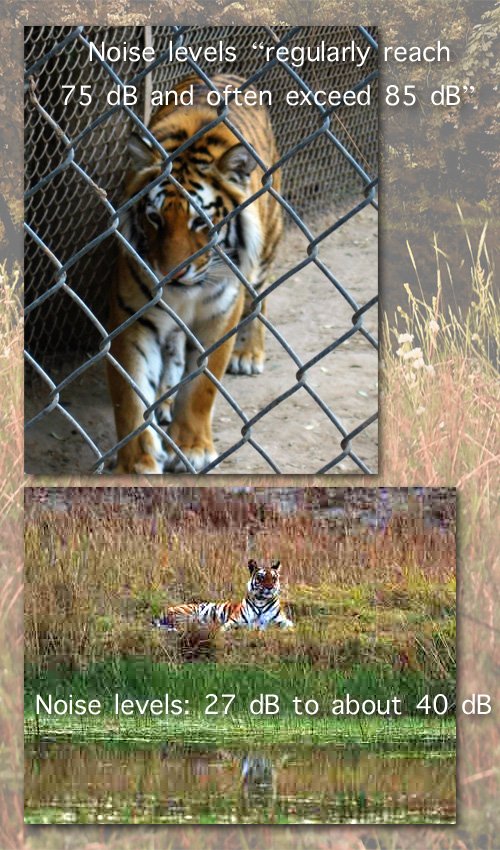In writing about how noise can stress captive wild cats we can gain an insight into how noise can affect domestic cats.
Captive wild cats don’t do well in captivity. This is evidenced, in part, in their inability to breed, which leads to management problems and ultimately inbreeding. Some experts predict the gradual extinguishment of all captive wild cats.
Wild cats in cages have to put up with “provocative sights, unpredictable sounds, and unfamiliar smells”1. The biggest problem and stressor for a captive cat is strange, unpredictable things happening coupled with the inability to do anything about it because they are in a confined area. This is a classic stress situation.
I am reminded of factory workers who have to do repetitive tasks all day. They have to work in an environment that is stressful because they have no control over it.

One of the worst stressors is noise (“acoustic stressors”). We are told¹ that there has been little research on how noise affects captive cats, which prompts me, as an animal lover, to ask, “why?”. Regrettably, I have to conclude that not enough respect has been given to the captive wild cat. Actually, we can extend that to all wild cats. I am sorry if that sounds annoying to some people. The gradual and consistent decline across the board of wild cat populations indicates that at heart we don’t care enough about them. Or at least not enough people care who have the authority and means to change things.
Because we don’t know how significant acoustic stressors are to wild cat welfare in zoos we can’t assess it that well and then take proper action to alleviate it. One blanket way of reducing stress in a wild cat is to tame the cat. That sounds a bit crude to me but I see the argument. Taming a wild cat is considered by some to be a “useful husbandry management technique”. A tame wild cat is better able to deal with human activities including sounds. That is, they will have reduced “severe stress reactions” to events in their artificial environment.
Zoos are environments where lots of human generated sounds and noises are produced. These are called “anthropogenic noises” – human generated sounds that affect nature. The sounds range from visitor conversations, air-conditioning, to cleaning equipment and audio systems. These sounds are magnified by the hard, easy to clean surfaces found in zoos. Noise levels can reach 90 decibels we are told¹.
A lot of these sounds can alarm a captive cat and make them more vigilant. The impact of acoustic stressors in zoos on a cat can be profound enough to cause the cat to be active nocturnally when it is quieter. It seems that smaller wild cats, who are naturally more wary as they are preyed upon, are more susceptible to reactive, distress response, behavior caused by unpredictable noise.
Prolonged exposure of wild cats to intense noise results in high blood pressure, increased metabolism, production of adrenaline, all of which can compromise the immune system making cats more susceptible to disease.
Lastly, the larger cats can detect infrasound – low frequency sound below 20 Hz. These sounds can be produced by engines. People don’t know how these sounds affect captive cats.
Reference:
- Stressors for Captive Exotic Felines by Chris T Tromborg PhD.


Wonder if the Feliway Diffuser or spray would work as it seems to work for the house cat. Its synthetic copy of the feline facial pheromone, used by cats to mark their territory as safe and secure.